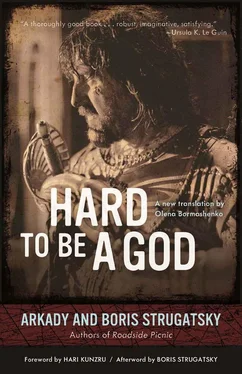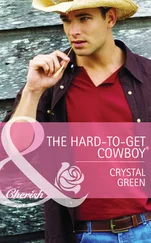The baron continued rotating the sword, but his face turned pensive. “But I have no other sword,” he said uncertainly.
“That’s even worse!” Rumata said significantly.
“You think so?” the baron still hesitated.
“You know this better than I do!”
“Yes,” said the baron. “You’re right.” He looked up at his furiously spinning wrist. “You may not believe me, my dear Rumata, but I can keep this up for three to four hours in a row—and I wouldn’t even get tired. Oh, why doesn’t she see me now!”
“I’ll tell her about it,” Rumata promised.
The baron sighed and lowered his sword. The gray soldiers ducked and rushed past him. The baron followed them with his eyes. “I wonder, I wonder…” he said indecisively. “Do you think I was right not to send them off with a kick to the rear?”
“You were absolutely right,” Rumata assured him.
“Well,” said the baron, sheathing his sword, “since we didn’t succeed in having a fight, we now finally have the right to have a bit of food and drink.” He dragged the still-unconscious gray lieutenant off the table by his feet and boomed, “Hey there, kind hostess! Food and wine!”
The young aristocrats came over and politely congratulated them on the victory.
“Nonsense, nonsense,” the baron said complacently. “Six miserable thugs, cowardly like all shopkeepers. I scattered two dozen of them in the Golden Horseshoe. How lucky,” he turned to Rumata, “that I didn’t have my fighting sword that time! I may have carelessly bared it. And even though the Golden Horseshoe isn’t a tavern but only an inn—”
“That’s how some say it,” said Rumata. “‘Thou shalt not bare thy blade in an inn.’”
The hostess brought some fresh plates of meat and jugs of wine. The baron rolled up his sleeves and dug in.
“By the way,” Rumata said, “Who were the three prisoners you freed in the Golden Horseshoe?”
“Freed?” the baron stopped chewing and stared at Rumata. “But, my noble friend, I must not have expressed myself clearly! I didn’t free anyone. They were under arrest—it’s a matter of state. Why in the world would I free them? There was a don, probably a big coward, an elderly bookworm, and a servant.” He shrugged his shoulders.
“Yes, of course,” Rumata said sadly.
The blood suddenly rushed to the baron’s face and he savagely rolled his eyes. “What! Again?” he roared.
Rumata looked around. Don Ripat was standing in the doorway. The baron began to get up, knocking over benches and scattering dishes. Don Ripat gave Rumata a significant look and went outside.
“I beg your pardon, Baron,” said Rumata, getting up. “His Majesty’s service…”
“Oh,” said the baron in disappointment. “My sympathy. I would never join the service!”
Don Ripat was waiting just outside the door.
“What is it?” Rumata asked.
“Two hours ago,” Don Ripat informed him briskly, “by the order of the Minister of the Defense of the Crown Don Reba, I arrested Doña Ocana and conveyed her to the Merry Tower.
“All right,” Rumata said.
“An hour ago, Doña Ocana died, unable to withstand the trial by fire.”
“All right,” Rumata said.
“Officially, she was charged with espionage. But…” Don Ripat faltered and looked down. “I think… It seems to me…”
“I understand,” Rumata said.
Don Ripat raised guilty eyes at him.
“It’s none of your business,” Rumata said gruffly.
Don Ripat’s eyes turned opaque again. Rumata nodded to him and went back to the table. The baron was polishing off a plate of stuffed cuttlefish.
“Pour me some Estorian wine!” said Rumata. “And let them bring more food.” He cleared his throat. “We’ll make merry. We’ll make merry, goddamn it.”
When Rumata came to, he found himself standing in the middle of a large vacant lot. A gray dawn was breaking; the timekeeping roosters were shrieking in the distance. Cawing crows were densely circling over some unpleasant heap nearby; it smelled of dampness and decay. The fog in his head was quickly dissipating, the familiar state of piercingly sharp and clear sensations was setting in, and something bitter and minty was pleasantly melting on his tongue. The fingers on his right hand really smarted. Rumata brought his clenched fist to his eyes. His knuckles were raw, and he was squeezing an empty vial of casparamid in his fist. Apparently, after he had already gotten to this vacant lot, before he had turned into a complete pig, he unconsciously, almost instinctively, poured the entire contents of the vial into his mouth.
The place was familiar—the tower of the burnt-out observatory loomed in front of him, and to his left he could see the thin, minaret-like watchtowers of the royal palace through the gloom. Rumata took a deep breath of cold damp air and headed home.
Baron Pampa had really made merry last night. Accompanied by a host of impecunious dons, who were quickly losing human form, he made a gigantic tour of the bars of Arkanar, drank away everything including his splendid belt, demolished an unbelievable quantity of food and drink, and got into at least eight fights along the way. At least, Rumata could distinctly recall eight fights he had intervened in, trying to break things up and prevent loss of life. His later memories were lost in the fog. Certain images floated up through the mist: predatory faces with knives in their teeth, the vacantly sad face of the last impecunious don, whom Baron Pampa was attempting to sell into slavery at the port, a furious hook-nosed Irukanian angrily demanding that the noble dons give back his horses…
Early in the night, he was still an operative. He drank as much as the baron: Irukanian wine, Estorian wine, Soanian wine, Arkanarian wine, but before each new wine he would furtively put a casparamid pill under his tongue. He still retained his judgment, and by force of habit noted the clusters of gray patrols at the intersections and bridges, and the outpost of mounted barbarians on the road to Soan, where the baron would certainly have been shot if Rumata hadn’t known the barbarian tongue. He distinctly recalled being shocked by the realization that the motionless rows of strange soldiers in long black hooded cloaks, who were lined up in front of the Patriotic School, were a monastic militia. What does the church have to do with anything? he thought then. Since when does the Arkanarian church interfere in secular affairs?
It had taken him a while to get drunk, but when he did, it happened abruptly, all at once; and when in a moment of clarity he saw an oak table cut in half in a completely unfamiliar room, a drawn sword in his hand, and the applauding impecunious dons around him, he did briefly think that it was time to go home. But it was too late. A wave of fury and repulsive, obscene joy at being free from everything human had already gotten hold of him. He was still an earthling, an operative, an heir to the people of fire and iron, who didn’t spare himself or others in the name of a great purpose. He couldn’t become Rumata of Estor, flesh of the flesh of twenty generations of warlike ancestors, renowned for their pillaging and drunkenness. But he was no longer a communard. He no longer had responsibilities to the Experiment. He was only concerned with his responsibilities to himself. He no longer had any doubts. He was certain of everything, absolutely everything. He knew exactly whose fault everything was, and he knew exactly what he wanted: to hack them to pieces, set them on fire, hurl them down from the palace steps onto the spears and pitchforks of a roaring crowd.
Rumata started and took his swords out of their scabbards. The blades were notched but clean. He remembered fighting with someone, but whom? And how did it end?
Читать дальше













